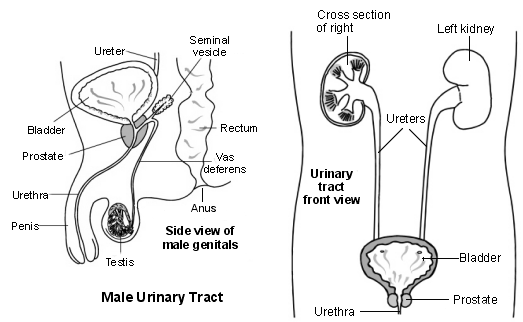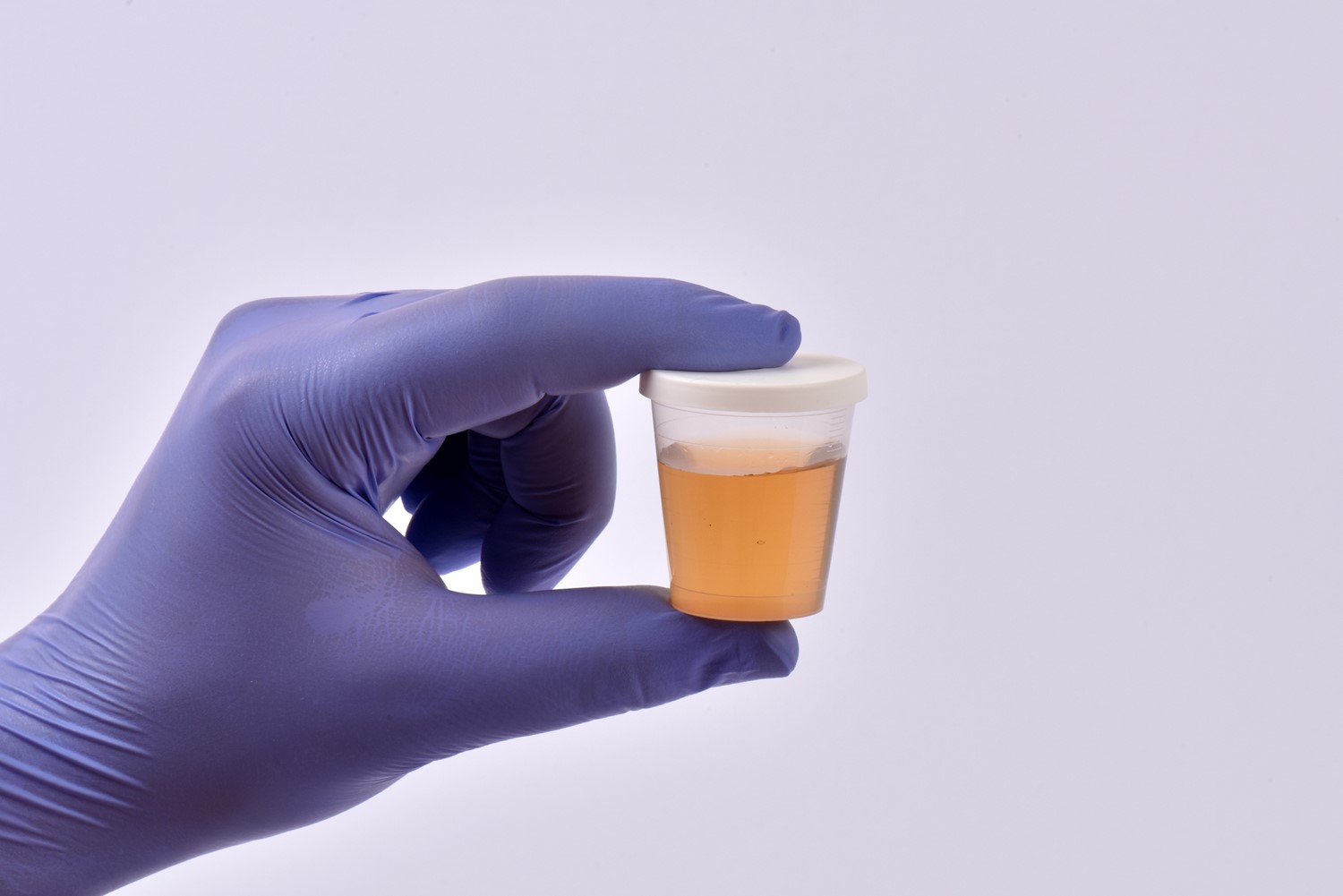Urinary tract infection in older people
Peer reviewed by Dr Rachel Hudson, MRCGPLast updated by Dr Toni Hazell, MRCGPLast updated 14 Nov 2024
Meets Patient’s editorial guidelines
- DownloadDownload
- Share
- Language
- Discussion
- Audio Version
In this series:Urine infection in menMidstream specimen of urine
If you have a urine infection, you have germs (bacteria) in your bladder, kidneys or the tubes of your urinary system. Urine infections, also called bladder infections, are more common in older people, and there is more likely to be an underlying cause.
In this article:
Video picks for Urinary problems
Continue reading below
How the urinary tract works
Urine is made by your two kidneys, one on each side of the tummy (abdomen). Urine drains down tubes called ureters into the bladder. There it is stored and passed out through a tube called the urethra, when you go to the toilet.
Male genitals side view and urinary tract cross-section diagram

Understanding urine infection
Back to contentsMost urine infections are caused by germs (bacteria) that come from your own bowel. They cause no harm in your bowel but can cause infection if they get into other parts of your body. Some bacteria lie around your back passage (anus) after you pass a stool. These bacteria sometimes travel up the tube called the urethra and into your bladder. Some bacteria thrive in urine and multiply quickly to cause infection.
A urine infection is often called a urinary tract infection (UTI) by healthcare professionals. When the infection is just in the bladder and urethra, this is called a lower UTI. If it travels up to affect one or both kidneys as well then it is called an upper UTI. This can be more serious than lower UTIs, as the kidneys can be damaged by the infection.
Continue reading below
UTI causes
Back to contentsIn many cases the infection occurs for no apparent reason. There is no problem with the bladder, kidney, prostate gland, or defence (immune) system that can be identified. In other cases, an underlying problem can increase the risk of developing a urine infection.
Urinary tract infection in older women
After the menopause the lining of tissues around your genital area may become more fragile. This is called atrophic vaginitis, or genitourinary syndrome of the menopause. It is associated with having more urine infections.
A prolapse of the womb (uterus) or vagina can also increase your risk of infection.
In older men
An enlarged prostate gland may stop the bladder from emptying properly. Some urine may then pool in the bladder. Germs (bacteria) are more likely to multiply and cause infection in a stagnant pool of urine.
In both
Bladder or kidney problems may lead to infections being more likely. For example, kidney stones or conditions that cause urine to pool and not drain properly.
Having a thin, flexible, hollow tube (called a catheter) in place to drain urine.
An underlying health condition may also be responsible. A poor immune system increases the risk of having any infection, including urine infections. For example, if you are having chemotherapy to treat cancer. Diabetes can also increase your risk of having urine infections.
Being constipated. If your lower gut (bowel) is full and swollen, it may press on the bladder. This may stop it emptying properly, making you more prone to urine infection.
Urinary tract infection symptoms in older people (seniors)
Back to contentsInfection in the bladder (cystitis):
Pain when you pass urine.
You pass urine more frequently.
You may have pain in your lower tummy (abdomen).
Your urine may become cloudy, bloody or offensive-smelling.
You may have a high temperature (fever).
Infection in the kidneys:
It may cause you to feel generally unwell.
There may be a pain in your back; this is usually around the side of the back (the loin), where each kidney is located.
You may have a high fever, which might feel like a chill or make you shake. You may feel sick, or be sick (vomit).
In some older people the only symptoms of the urine infection may be becoming confused or just feeling generally unwell.
The confusion is caused by a combination of factors such as having a fever and having a lack of fluid in the body (dehydration). The confusion should pass when the infection has been treated. An infection which is left untreated can lead to sepsis, which can be very serious, or to long-term kidney damage.
Continue reading below
Treatment of UTI in elderly people (male and female)
Back to contentsA course of an antibiotic medicine will usually clear the infection quickly. You should see a doctor if your symptoms are not gone, or nearly gone, after a few days.
Paracetamol or ibuprofen will usually ease any pain, discomfort, or high temperature (fever).
An underlying cause such as an enlarged prostate gland or constipation may be found and need treatment.
It is helpful to drink plenty of water.
Frequently Asked Questions
Back to contentsHow common are urine infections?
Urine infections are much more common in women than in men. This is because in women the urethra - the tube from the bladder that passes out urine - is shorter. Also it opens nearer the back passage (anus) than in men. Half of all women will have a urine infection that needs treating in their lifetime.
Urine infections are less common in men. They are very uncommon in young and middle-aged men. They are more common in older men. Men who have to use a urinary catheter are at higher risk of a UTI. A catheter is a thin, flexible, hollow tube used to drain urine. Older men are more likely to need a catheter because of prostate problems, which become more common with age.
Urine infections tend to become more common as you get older.
Are any tests needed?
In some cases the diagnosis may be obvious and no tests are needed. For a woman who is aged under 65 and is not pregnant, it would be reasonable for a GP to provide antibiotics on the basis of a phone call with appropriate symptoms, though this might not be done if it was a second UTI in a short period of time. A test on a urine sample is sometimes used to confirm the diagnosis and identify what germ (bacterium) is causing the infection. Sometimes a dipstick test can provide enough information immediately. In other cases the urine sample is sent to a laboratory for further examination under a microscope. This result takes several days.
Further tests are not usually necessary if you are otherwise well and have a one-off infection. However, your doctor may advise tests of your kidney or bladder if an underlying problem is suspected.
An underlying problem is more likely if the infection does not clear with antibiotic medication, or if you have:
Symptoms that suggest a kidney is infected (and not just the bladder).
Recurring urine infections (for example, two or more episodes in a three-month period).
Had problems with your kidney in the past, such as kidney stones or a damaged kidney.
Symptoms that suggest a blockage (an obstruction) to the flow of urine.
Relevant tests may include:
A blood test.
A scan of your kidneys or bladder, such as an ultrasound scan.
Tests to see how well your bladder is functioning, called urodynamic tests.
A look inside your bladder with a special telescope (cystoscopy).
What is the outlook (prognosis)?
Most people improve within a few days of starting treatment. See a doctor if you do not quickly improve. If your symptoms do not improve despite taking an antibiotic medicine then you may need an alternative antibiotic. This is because some bacteria are resistant to some types of antibiotics. This can be identified from tests done on your urine sample.
Can I prevent urine infections?
There are some measures which may help in some cases:
It makes sense to avoid constipation, by eating plenty of fibre (such as fruit) and drinking enough fluid.
Older women with atrophic vaginitis may wish to consider hormone replacement creams or pessaries. These have been shown to help prevent urine infections.
If there is an underlying medical problem, treatment for this may stop urine infections occurring.
For some people with repeated urine infections, a preventative low dose of antibiotic taken continuously may be prescribed.
Women should wipe themselves from front to back after opening their bowels, to avoid getting germs (bacteria) from the bowel into the bladder.
Patient picks for Urinary problems

Men's health
Lower urinary tract symptoms in men
Lower urinary tract symptoms (LUTS) are a very common problem, especially in men over the age of 65 years. They can be caused by various conditions. These symptoms may include slowing of the urine stream and needing to get up to pass urine at night. There are different causes of LUTS and the treatment will depend on the cause. Some men choose not to have treatment if their symptoms are not too bothersome and the cause is not serious.
by Dr Philippa Vincent, MRCGP

Women's health
Lower urinary tract symptoms in women
Lower urinary tract symptoms (LUTS) are common in women of all ages, especially between the ages of 40-60. For many women, the symptoms come and go. But for some women, the symptoms are ongoing and interfere with normal life. The symptoms may include wetting yourself (incontinence), needing to pass urine frequently, or discomfort passing urine. These and other symptoms can result in poor quality of life. Many women never tell anyone about their symptoms. Your doctor may recommend tests to look for an underlying cause. Referral to a specialist is not usually needed. Often, no specific underlying cause is found. Treatment may help to relieve symptoms.
by Dr Rachel Hudson, MRCGP
Further reading and references
- Urological infections; European Association of Urology (2022 -updated 2024)
- Urinary tract infection (lower) - women; NICE CKS, February 2025 (UK access only)
- Urinary tract infection (lower) - men; NICE CKS, July 2022 (UK access only)
Continue reading below
Article history
The information on this page is written and peer reviewed by qualified clinicians.
Next review due: 13 Nov 2027
14 Nov 2024 | Latest version

Ask, share, connect.
Browse discussions, ask questions, and share experiences across hundreds of health topics.

Feeling unwell?
Assess your symptoms online for free
Sign up to the Patient newsletter
Your weekly dose of clear, trustworthy health advice - written to help you feel informed, confident and in control.
By subscribing you accept our Privacy Policy. You can unsubscribe at any time. We never sell your data.